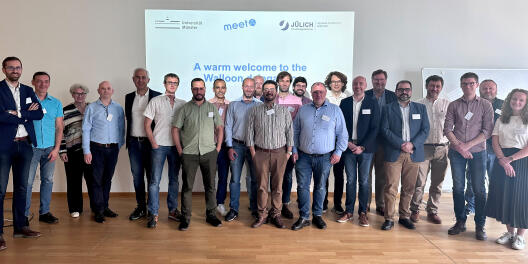Joint Development of Sustainable Recycling Strategies
Metals such as lithium, cobalt, manganese and nickel are essential for the production of high-performance battery cells. The strategic development of a recycling system for batteries in Europe is crucial to ensure that these valuable materials remain in the value-added cycle. In order to explore cooperation opportunities in the field of sustainable recycling processes and to get to know Münster as a battery location more intensively, a Walloon delegation from the fields of research, development and battery cell production visited MEET Battery Research Center at the University of Münster on 25 June 2024.

Pushing Ahead with Energy Transition Together
In Belgium, industry and academia focus in particular on developing a safe, economically viable and ecologically sustainable recycling strategy. The integration of automation, digitalization and artificial intelligence as solutions for the complicated dismantling of batteries is a key aspect of their research. The Walloon battery experts also develop innovative cathode and anode materials as well as electrolyte formulations that will not only improve the performance of batteries, but also reduce the environmental impact. " To establish sustainable processes, we need strong partnerships in Europe", emphasized Jean-Paul de Mussy, battery expert at the industrial innovation network Pôle MecaTech. "Thanks to its strong battery ecosystem, Münster is a particularly attractive hub for strong collaborations."
Combining Strengths – Developing Sustainable Processes
Münster has established itself as a hotspot for battery research and development. Strong international industrial companies have settled here alongside MEET Battery Research Center at the University of Münster and other university research groups, Helmholtz Institute Münster of Forschungszentrum Jülich and the Fraunhofer Research Institution for Battery Cell Production FFB. More than 500 players work locally on the sustainable production of battery systems.
Dr. Falko Schappacher, Managing Director of MEET Battery Research Center, identifies enormous potential in a collaboration: "The increasing demand for batteries for electric vehicles, for example, will result in more and more used batteries in the future, whose materials need to be returned to the supply chain. Sustainable recycling processes and strong partnerships are therefore crucial. By strategically joining the expertise from Belgium and Germany in the field of battery recycling, we can continue to advance innovations for a circular economy of batteries." The cooperation opportunities discussed will now be further specified and transferred into project ideas.

